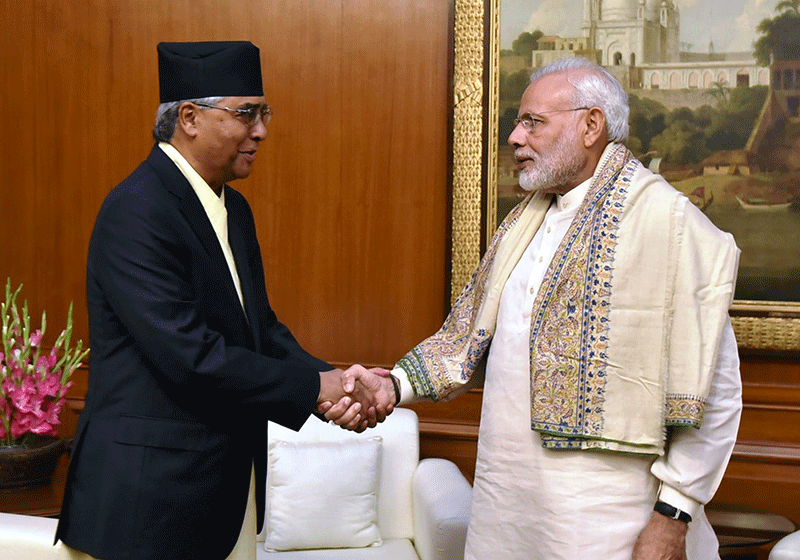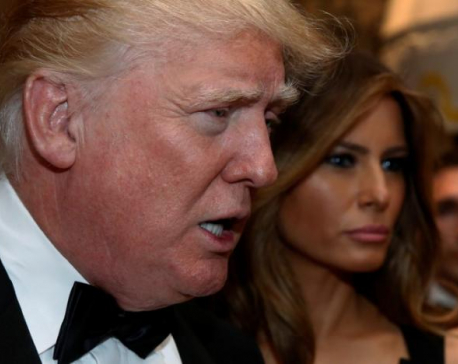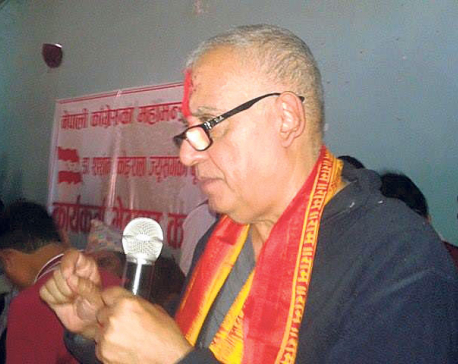
OR
BEYOND BORDERS


Biswas Baral
Biswas Baral has been associated with Republica national daily as a journalist since 2011. He oversees the op-ed pages of Republica and writes and reports on Nepal's foreign affairs. He is a regular contributor to The Wire (India).biswas.baral@myrepublica.com
More from Author
Deuba’s pro-West image, in the reckoning of some, makes it difficult for China to trust the new prime minister with OBOR.
An internal memo sent by the American Embassy in Kathmandu on June 2, 2004 that was later published by Wikileaks offers a clue about foreign policy inclinations of now four-time Prime Minister Sher Bahadur Deuba. Back then, King Gyanendra had just restored the veteran Congress leader as prime minister, barely three years after throwing him out of office in 2001.
Deuba is “friendly to the US”, reads the 2004 cable, and someone who “staunchly supports a western approach to the economy and favors US investment in Nepal”. Perhaps this sweet spot for the Yanks is the reason the Chinese have never been comfortable with Deuba. More than India, it is the western powers, and chiefly the US, China fears the most in Nepal. This has been the case since the CIA, way back in 1959, started training a ‘Tibetan resistance force’ in Mustang to foment an uprising in Tibet.
Coming to present, nor would it have gone unnoticed in Beijing that the American Embassy in Nepal has for the very first time emphasized on the need to “complete local election”, presumably without a prior constitutional settlement, as soon as Deuba took office.
Deuba’s pro-West image, in the reckoning of some foreign policy analysts in Kathmandu that this writer talked to, makes it difficult for China to trust his government with the projects being pursued under the recently signed OBOR framework agreement. Yet it was interesting that the outgoing foreign minister, Prakash Saran Mahat, who, at Deuba’s bidding, was initially cool on OBOR, was personally championing the initiative as the date of signing approached.
Deuba’s anti-China image was further cemented in the eyes of the Chinese when he was pictured in Goa in November 2016 sharing a stage with Lobsang Sangay, the prime minister of the Tibetan Government in Exile. The Chinese Embassy in Kathmandu was incensed and lodged a strong objection with the Ministry of Foreign Affairs, questioning the commitment of the Nepali political class to ‘One China’ policy.
But some analysts believe it would be wrong to read too much into Deuba’s past foreign policy inclinations for a clue of how he will perform while in office this time. “Deuba is a shrewd politician,” says a veteran Congressi leader. “He knows very well how to tap into popular sentiment.” This leader was thus confident that Deuba would make an effort to push the “popular” OBOR-related projects in Nepal.
New Delhi calling
But Deuba is perhaps also a more reliable partner for India compared to the forever flipping-and-flopping Pushpa Kamal Dahal. One of the big reasons Dahal had to relinquish his prime minister post in 2009, after only nine months in office, was that he had made China his first foreign stop, thereby breaking with the long tradition of a new Nepali prime minister first visiting New Delhi on assuming office.
In comparison, both Sher Bahadur Deuba and his wife Arzoo are in easy terms with many veteran Indian leaders, as well as with the broader diplomatic and journalistic communities. This time, to preempt the Chinese, and pull Deuba still closer, India is already laying the ground for the new prime minister’s official India trip.
The foreign policy script for Deuba has broadly been written. India’s expectations of Deuba becomes clear from a recent article in The Indian Express by SD Muni, a veteran Nepali watcher, where he urges the new Nepali prime minister to “engage actively with China”, yet, curiously, also cautions that Deuba and his country have much to learn “from the experience of China’s role in Sri Lanka, Myanmar and even Pakistan”. In all these countries, writes Muni, China has resolutely pushed its strategic objectives under the cover of economic cooperation and infrastructural projects.
So while the Chinese are obsessed with minimizing the presence of western powers in Nepal, India continues to be hung up on China and the old fear of possible encirclement by the communist dictatorship.
With India opting out of OBOR, the Modi government could make a concerted push into the six countries in South Asia that have signed up for Chinese President Xi Jinping’s flagship foreign policy project (among SAARC countries, only India and Bhutan have not formally joined).
New Delhi under Modi has decided that, to keep Kathmandu firmly under its sphere, there is no point on banging on about the Madhesi issue, a folly which, in the reckoning of the Indian establishment, only helped bring Beijing closer to Kathmandu. This is why the new Indian envoy, Manjeev Singh Puri, keeps urging Madhesi parties to abandon protests and to establish their agendas through elections.
The old line of inclusion of Madhesi forces into national mainstream has been conveniently abandoned, and India’s new modus operandi in Nepal is guided by its one and only desire to counter what it sees as China’s growing influence.
This sits well with Modi’s quite effective electoral strategy of whipping up Hindutwa-based nationalism and painting China and Pakistan as mortal enemies of India. He will continue to bank on it for the 2019 general elections.
India, in this context, has been trying to isolate Pakistan in South Asia. One reason it did not sign up for OBOR was that a proposed oil pipeline under OBOR passed through Pakistan Occupied Kashmir, which India claims as its territory. India reckons that the only way the growing bonhomie between China and Pakistan, with all its implications for South Asia, can be countered is by increasing its own foothold in the region—and beyond.
Recently, India and Japan, two established democracies, decided to step up their military cooperation and to develop a ‘Freedom Corridor’, stretching from Asia-Pacific to Africa, in what is being seen as a direct challenge to OBOR.
Shanghai sideshow
To offset not joining the OBOR, India has instead decided to join the Shanghai Cooperation Organization (SCO), a security and political union of Eurasian countries. This forum, writes Manoj Joshi in The Wire, allows India to kill two birds with one stone: the organization gives India a platform to engage with Pakistan, another new SCO entrant, in a wider regional setting (as Modi does not want to be seen directly dealing with it). Membership of the organization is also an opening to reach out to China bilaterally, again without being seen as falling under China’s growing shadow, which is what OBOR membership would have supposedly hinted.
It will be under this framework of minimizing China’s influence (and, to a lesser extent, of isolating Pakistan) that India will look to engage with Nepal in the days ahead. Of course, this Indian plan is not much different to the efforts of the Communist Party of China to gain domestic legitimacy by projecting itself as a bulwark against the ‘decadent American imperialism’.
In the end, Deuba, as the veteran Congressi leader quoted above hinted, is above all a transactional leader, who has few close-held beliefs and who is forever ready to ‘compromise’ for votes and public adulation. Expect him to continue to keep the westerners and NGO-wallahs happy, to look to New Delhi for guidance while also pushing Nepal-China ties for public consumption.
biswasbaral@gmail.com
You May Like This

Held Indian police team handed to Indian authority
BHIMDATTANAGAR (Kanchanpur), June 2: An Indian police team which was taken under control for arresting and transporting a Nepali national... Read More...

Chinese state tabloid warns Trump, end one China policy and China will take revenge
SHANGHAI/TAIPEI, Jan 9: State-run Chinese tabloid Global Times warned U.S. President-elect Donald Trump that China would "take revenge" if he reneged... Read More...

Deuba's act of irritating China 'inappropriate' : Shashank Koirala
DHANGADHI, Nov 8: Nepali Congress (NC) General Secretary Shashank Koirala has said that the reported participation of the party president Sher... Read More...




Just In
- Govt receives 1,658 proposals for startup loans; Minimum of 50 points required for eligibility
- Unified Socialist leader Sodari appointed Sudurpaschim CM
- One Nepali dies in UAE flood
- Madhesh Province CM Yadav expands cabinet
- 12-hour OPD service at Damauli Hospital from Thursday
- Lawmaker Dr Sharma provides Rs 2 million to children's hospital
- BFIs' lending to private sector increases by only 4.3 percent to Rs 5.087 trillion in first eight months of current FY
- NEPSE nosedives 19.56 points; daily turnover falls to Rs 2.09 billion















Leave A Comment